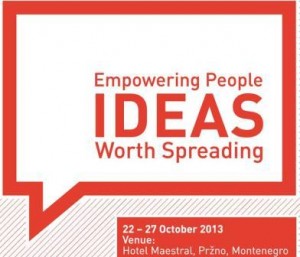 The organization “Civil Rights Defenders” held a conference entitled Creative Forces: Empowering People – Ideas Worth Spreading. It took place in Pržno, Montenegro, and lasted six days, from October 22-27, 2013. The organizers of the conference came from Albania, Bosnia and Herzegovina, Kosovo, and Serbia. Dina Vilić and Latifa Imamović from Sarajevo Open Center participated.
The organization “Civil Rights Defenders” held a conference entitled Creative Forces: Empowering People – Ideas Worth Spreading. It took place in Pržno, Montenegro, and lasted six days, from October 22-27, 2013. The organizers of the conference came from Albania, Bosnia and Herzegovina, Kosovo, and Serbia. Dina Vilić and Latifa Imamović from Sarajevo Open Center participated.
The goal of the conference was to train people in optimal methods of preparing campaigns and projects, cultivating a public image, gaining members, and strengthening the community in which they work. A lot of attention was devoted to social media, the strongest tool for lobbying and advocacy. World-famous journalist and strategic media consultant David Brewer gave lessons on social media, while Ruben Brunsveld from the Stockholm Institute for Public Speaking offered a course on communication strategies. He gave special attention to methods of connecting to a target group, whether they be potential donors or a community of people to be strengthened.
Each organization had the task of writing a speech and presenting their idea in front of everyone. Maša Milutinović and Ivan Đurić from the Youth Initiative for Human Rights spoke about how to make big initiatives happen with a small budget. Chris Michael, a producer and speaker for human rights, gave a lesson about the tactics and methodology of using video as a tool for advocacy. Then each organization had to make a video campaign lasting a few minutes.
Srećko Šekeljić explained how to take an idea and turn it into a concrete, effective project. Then each organization was tasked with presenting their idea concretely, concisely, and consistently. Afterwards, Heda Krausz Sjorgen, a playwright and producer from Sweden, spoke about her project SEVEN. It is a documentary drama about seven strong, unwavering women read on stage by successful women around the world.
One more important tool was presented: the Ushahidi Open Source Project. Ushahidi, which means testimony in Swahili, is a website that was originally developed to map reports of violence in Kenya. The site has grown into a platform that can be used worldwide as an interactive mapping tool.
On the first day of the conference, each organization had to present the idea on which it wanted to work. Over the next six days the idea developed into a project which was then presented to everyone and orally assessed.